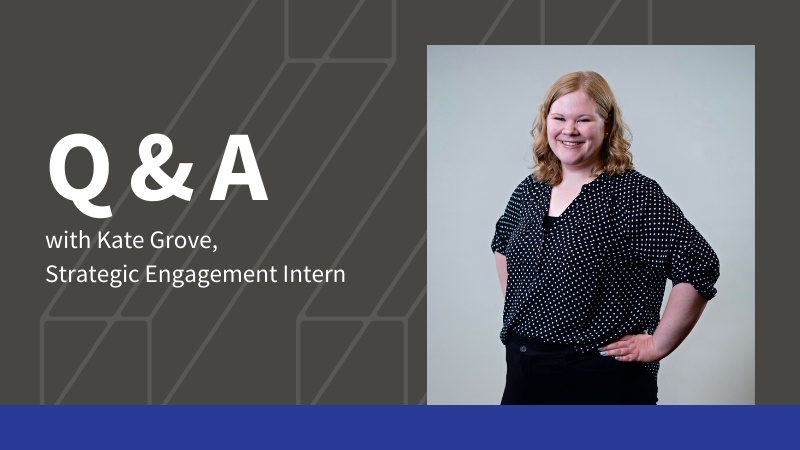
In summer 2021, Kate Grove worked with MCAN as an intern in the Strategic Engagement department. Kate is heading back to Central Michigan University for the fall to finish up her double major in integrative public relations and women and gender studies. Before she left, we asked her to reflect on her time at MCAN and what she learned about college access and nonprofit work.
What is your college access story? And, how has your educational experience informed your approach to this communications role?
I’m privileged to have grown up in a family that was able to help me navigate things like college applications and the financial aid process. After graduating in 2017, I spent my freshman year of college at Mid Michigan College (MMC) before transferring to Central Michigan University. This decision was motivated by a desire to save money on my prerequisite courses, but ultimately I think this was the best way for me to transition into college. I was lucky to have stellar educators in high school and at MMC who encouraged me to pursue my interests; I also had a wonderful transfer adviser at CMU who really took the time to get to know me and my interests, and connected me to programs of study and student organizations that gave me a clear sense of direction once I transferred. I decided on my first major, Integrative Public Relations, a few weeks into my first semester at CMU, and by my second semester, picked up a second major in Women and Gender Studies. The combination of these two majors gave me a background in advocacy work and community outreach and made jumping into MCAN’s work easy.
What drew you to MCAN?
In a way, it was kind of serendipitous. Ryan Fewins-Bliss, MCAN’s executive director, came and spoke to a student organization I was a part of sometime in early 2020. At the event, I asked him a few questions about MCAN and took his business card. I tucked the card into my desk, and largely forgot about it for a year until I found the card again while I was in the process of looking for a summer internship. I decided to look MCAN up and spent some time reading about the organization’s mission of education equity. It was this mission -- along with MCAN’s approach to organizing both at the community level and the state-wide level -- that pushed me to reach out, even though there wasn’t even an internship position being advertised. I reached out and asked for an interview, thinking nothing would come of it, and 300 hours later here I am!
What have you been surprised to learn about college access during your time at MCAN this summer?
I knew that going to college could be transformational at an individual level, but I’d never thought of how college access can be, as MCAN says, a public good. MCAN is a very data-driven organization, and it’s been really informative to see how college access works as a method of fighting poverty, not in an abstract way, but in an evidence-based, numbers-driven way. On top of that, my time at MCAN has helped me see how college access translates to things like increased civic engagement and can be a tool in the success of other social equity movements, like the fight to end mass incarceration. Of course, college access only supports these efforts if we give communities the resources needed to empower all students to seek some form of postsecondary education.
How has your time at MCAN changed your perceptions of higher education?
My time at MCAN has shown me where we can do better when we talk about higher education. It’s easy to acknowledge the privilege of having access to and attending a four-year university, but there’s still a lot of work to be done to abandon the negative attitudes directed toward students who choose to pursue community college or a skilled trades certificate. The college access movement is doing the work to help people unlearn attitudes like “some students aren’t college material” and “it’s only community college”, but there’s a lot of ground to cover before this shift in values will stick.
Beyond your role within the Strategic Engagement department, what other areas of MCAN's work have you been excited to learn more about?
Learning about how the Local College Access Networks work was a pretty cool experience. Seeing each LCAN’s unique approach to helping students in their community helped me see what the results of MCAN’s work is. I also really enjoyed learning about AdviseMI and College Completion Corps. I got to work with a few advisers and coaches through my strategic engagement work, and it was neat to hear about the experiences of the people who are directly supporting students as they pursue higher education.
How has this internship affected your career path and the types of work you're thinking about for your future?
This internship has really helped me solidify what I want to do post-graduation. I can definitely see myself staying in the nonprofit realm, but most of all I want to keep doing work that helps people, as cheesy as that sounds. Before my internship with MCAN I knew very little about the college access movement, but with the experience I’ve gained, it’s now a career path I’m strongly considering.
Former MCAN intern Kate Grove reflects on her summer with MCAN and what she learned about college access and nonprofit work.